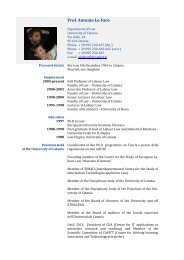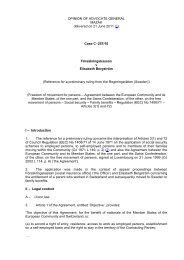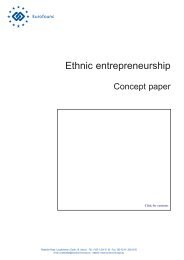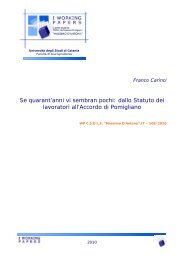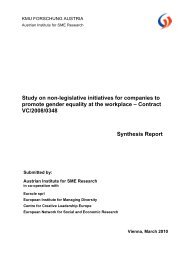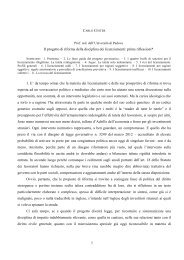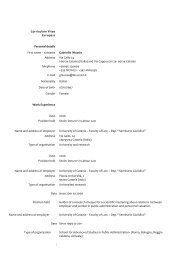Full text - European Trade Union Institute (ETUI)
Full text - European Trade Union Institute (ETUI)
Full text - European Trade Union Institute (ETUI)
Create successful ePaper yourself
Turn your PDF publications into a flip-book with our unique Google optimized e-Paper software.
Isabelle Schömann and Coralie Guedes<br />
Does the minimum protection for posted workers<br />
correspond to that provided to temporary agency<br />
workers on cross-border assignments<br />
Following the CJEU’s jurisprudence, the Posting of Workers Directive deals<br />
essentially with the free provision of services and much less with the protection<br />
of workers. Consequently, protective standards of the domestic labour<br />
law of the host country are applicable only when they pass a strict proportionality<br />
test to ensure that such protection does not go beyond what is necessary<br />
for attaining the minimum standards that the Directive allows (Ejvu 2011).<br />
Therefore, as mentioned by the <strong>European</strong> Commission (COM (2003) 458 final)<br />
‘Member States are not free to impose all their mandatory labour law<br />
provisions [whether domestic legislation or collective agreements] on service<br />
providers established in another Member State’. Terms and conditions that<br />
the host country should provide, as laid down in Article 3 (1) are (a) maximum<br />
work periods and minimum rest periods, (b) minimum paid annual holidays,<br />
(c) minimum rates of pay, including overtime rates – this point does not apply<br />
to supplementary occupational retirement pension schemes, (d) the conditions<br />
of hiring-out of workers, in particular the supply of workers by temporary<br />
employment undertakings, (e) health, safety and hygiene at work, (f)<br />
protective measures with regard to the terms and conditions of employment<br />
of pregnant women or women who have recently given birth, of children and<br />
of young people and (g) equality of treatment between men and women and<br />
other provisions on non-discrimination, when available in law, regulation,<br />
administrative acts and/or collective agreements and arbitration awards.<br />
However, Article 3 (1) (d) and (9) of the Posting of Workers Directive incorporates<br />
the conditions applicable to temporary agency work into the scope<br />
of those minimum standards the host country is entitled to impose on foreign<br />
service providers. As a consequence, the work contract between temporary<br />
work agencies and their temporary agency workers will be ruled by the<br />
home country’s regulations. As far as minimum rates of pay are concerned,<br />
the member state to whose territory the worker is posted can stipulate that<br />
temporary work agencies must guarantee workers the terms and conditions<br />
of employment applicable to their domestic agency workers: on one hand, this<br />
can lead to aligning the working conditions of cross-border temporary agency<br />
workers with those of domestic agency workers in the host country. On the<br />
other hand, however, implementation of this provision would certainly conflict<br />
with the freedom to provide services (Laulom 2012). Here again the different<br />
aim and legal basis of the Temporary Agency Work Directive (worker<br />
protection – former Article 137(2) TEC) and the Posting of Workers Directive<br />
(free movement of persons and services – former Articles 57 (2) and 66 TEC)<br />
are conflicting, creating discriminatory measures for cross-border workers.<br />
Indeed, cross-border temporary agency workers will be better off than other<br />
posted (but non-temporary agency) workers who will be guaranteed only<br />
minimum standards. According to Schlachter (2012), ‘for an internal market<br />
it would be logical that the rules for [cross-border temporary] agency workers<br />
do not differ in content depending on the category of either national or transnational<br />
posting’ and to wish that ‘terms and conditions of work for posted<br />
58 WP 2012.13




